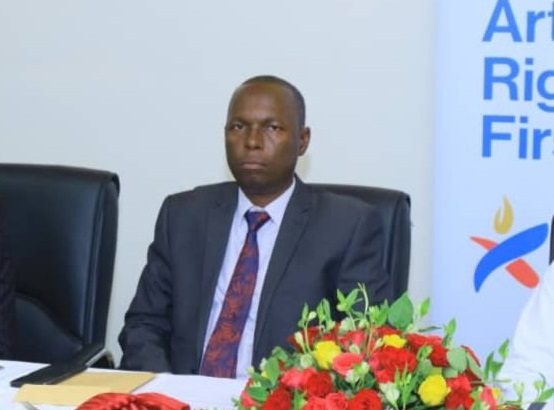
Kampala, Uganda | THE INDEPENDENT | The Ministry of Gender, Labour, and Social Development is reviewing the Family Policy draft to ensure harmonization with current societal realities and incorporate inputs from various stakeholders.
The draft policy seeks to protect the at-risk family unit which is crucial for the country’s well-being and development. It also identifies challenges faced by the family and provides guidelines for government and stakeholders to address them.
Bernard Lubega Bakaye, Assistant Commissioner in charge of Culture at the Gender Ministry, said that the review aims to create an improved draft document. He added that the refined version will then undergo final scrutiny by stakeholders before being presented to the cabinet for consideration.
Bakaye made the remarks at a media briefing in Kampala on the sidelines of a workshop that brought together experts from legal, academia, civil society Organizations, and the government. The purpose of the workshop was to make policy adjustments based on input from various stakeholders.
Amid changing times and various factors such as shifts in family structure limiting socio-economic support systems, spousal challenges, absentee parents, divorce, diseases, youth-related issues, and the influence of technology, families in Uganda, like elsewhere in the world, are facing instability. This has resulted in numerous societal problems that also have repercussions on overall development.
In 2016, recognizing the challenges impacting various sectors of the economy, President Yoweri Museveni designated 2017 as a family year. This initiative aimed to address these challenges by implementing strategies, including the development of the National Family Policy and Parenting Guidelines.
The goal was to enhance the family’s functionality, focusing on family creation (such as marriage and adopting children), economic support (financial provision for basic needs and ensuring stability), and childcare, parenting, socialization, and the overall well-being of family members (including parental care and assistance for the disabled, frail, ill, elderly, and youth).
According to the given timeline in the document titled The National Roadmap on the Year of the Family 2017 in Uganda, the national family policy, initially scheduled for rollout in May 2017, has remained in draft form.
Bakaye justified the delay, highlighting the ongoing collection of valuable input during consultations. He stressed the need to avoid haste to prevent an incomplete policy, emphasizing thorough research to prevent duplication with existing policies.
Additionally, the commissioner mentioned evaluations of existing policies affecting family dynamics, such as child, youth, and early childhood development policies.
Sources indicate that the initial document met some resistance as some groups opposed some of its contents and this caused part of the delays. For instance, it is said that the draft was crafted with a Christian-centric view, emphasizing a traditionally defined family structure involving parents, children, and close relatives.
However, during consultation meetings with stakeholders, including Muslims, culturalists, and civil society organizations, these ideas faced rejection. Each group proposed their perspective on the concept of family. Consequently, the definition has been expanded to encompass a broader meaning, now recognizing a family as a primary social group consisting of two or more individuals related by blood, marriage, adoption, or placement.
Maria Bukirwa, the programs manager at Women’s Pro Bono Initiative, said that during the ongoing review, they have tried to define the concept of a family in the Ugandan context, acknowledging emerging family structures like single-parent households, Women headed families, child-headed families, customary guidance relationships, and fostering, among others.
Despite some perceiving this as a departure from traditional family norms, Bukirwa clarified that the policy aims not to break with tradition but to recognize and support the evolving family structures in the country. She added that the goal is to address challenges where needed and implement clear solutions to mitigate any perceived negative impacts.
Dorothy Amuron, Acting Deputy Executive Director for Programs at the Centre for Health, Human Rights, and Development, highlighted the commitment of Civil Society Organizations (CSOs) to ensure that the policy recognizes the current realities in Ugandan communities. This involves understanding the contemporary definition and challenges faced by the family as an institution.
Amuron emphasized that addressing the reality enables the government and stakeholders, including religious and cultural institutions and the citizenry, to tackle gaps causing family breakdowns. She stressed the importance of seeking solutions or adaptive measures without being biased by traditional definitions. According to her, if the policy doesn’t resonate with the community, it might end up unused on the shelf.
Dr. Patricia Atim P’Odong, a renowned family law scholar and the Head of Clinical Legal Education at Makerere University School of Law, stressed the importance of aligning the policy in a draft with Uganda’s legal frameworks. As a member of the team reviewing the draft, she underlined that any family structures or related issues explicitly prohibited by Ugandan laws are entertained in the policy.
“Don’t be alarmed. The family policy is being crafted to fortify the family institution while remaining attuned to the realities of our societies. It is a document tailored for our society and values, viewing emerging issues through a fresh perspective, but it does not endorse anything prohibited by our laws,” Dr. Atim said.
Dr. Atim emphasized that once implemented, the policy will have a significant impact on emerging family structures in society, including child-headed families, and single-parent families resulting from factors like disease and war. She sees the identification of such structures as a basis to explore how government systems can offer support, ensuring a decent life and promoting their rights.
Dr. Atim highlighted that many countries, including Kenya and South Africa, have adopted improved social protection models based on family policies. These models include supportive measures such as tax exemptions, and health insurance, targeting various family structures like those led by children, those with a large number of children, and those headed by single parents.
The aim is to assist these families in overcoming existing challenges and to promote their cohesion, reflecting a proactive approach to addressing encountered difficulties.
*******
URN
 The Independent Uganda: You get the Truth we Pay the Price
The Independent Uganda: You get the Truth we Pay the Price


